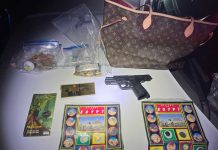SANTA CLARA
– The prosecution landed the first blow Thursday in the upcoming
first-degree murder trial of Gustavo Covian. Judge Thomas Hastings
ruled that a police videotape showing Covian asking for God’s help
so that police
”
don’t find the gun
”
can be used as evidence.
SANTA CLARA – The prosecution landed the first blow Thursday in the upcoming first-degree murder trial of Gustavo Covian. Judge Thomas Hastings ruled that a police videotape showing Covian asking for God’s help so that police “don’t find the gun” can be used as evidence.
If convicted of being the hitman in an alleged murder-for-hire scheme linked to the 1998 disappearance of a Gilroy restaurant owner and father of two, Covian could face life in jail without parole, although the body of the missing man has never been recovered.
“The law was on our side, and we expected the judge to agree” on the legality of the video, Peter Waite, deputy district attorney, said. The trial is set to begin in Santa Clara Tuesday. “Obviously (the video) will help our case.”
The video in question was recorded by a camera mounted in the Gilroy Police Department patrol car where Covian was placed after being arrested at his Hollister home in April 2000.
The black-and-white tape, played during the hearing Thursday, shows Covian, 39, praying aloud in Spanish. It also goes on to include a conversation Covian has with his fellow defendant and then-wife, Maria Covian – who will be tried separately with two other defendants – after she was arrested and placed in the same car 30 minutes later.
A transcript of the tape provided by a Santa Clara County Superior Court translator allegedly quotes Covian as asking God that the police “don’t find the gun,” according to Waite. Details of the conversation between the husband and wife were not disclosed because Waite said he preferred to wait until the trial.
“This evidence is unconstitutional because Mr. Covian had a reasonable expectation of privacy,” Gustavo Covian’s defense attorney Thomas Worthington told Judge Hastings during the evidence hearing Thursday. “He thought the things he was saying were going to be private because there was no camera in plain view.”
Worthington continued to argue that Covian was protected under the state and federal constitutions to private information privileges extended to discussions involving members of the clergy and spouses.
But God is not a clergy person, and since Maria Covian also is a suspect in the case, any marital privilege is moot, Hastings ruled.
Worthington then called Gustavo Covian to the witness stand and attempted to demonstrate to Hastings that the 6-by-2 inch camera mounted adjacent to the rearview mirror on all GPD marked cars was concealed.
Covian dressed in a plaid, button-down dress shirt, khaki pants and with his hair neatly combed said that he was not aware of a camera in the car.
“I was not paying attention,” Covian responded through a Spanish interpreter. “I was just scared and praying.”
Gustavo Covian, Maria Covian, Gustavo’s brother Ignacio Covian, 31, and Kyung Kim, 46, are all charged with involvement in the November 1998 disappearance and suspected murder of 49-year-old Young Kim, Kyung Kim’s husband of 24 years and owner of the former Gavilan Restaurant at 6120 Monterey Road south of Bob Lynch Ford.
The four defendants are all facing charges of first-degree murder and could be sentenced to life in prison. All have been in custody in county jail since 2001.
When the trial begins Tuesday, a jury selected from throughout the county will try to sort out exactly what happened to Young Kim, who according to court documents was last seen entering his Gilroy home in the 9400 block of Rancho Hills Drive in November 1998. Following his disappearance, Kyung Kim waited 16 days to report her husband missing to Gilroy police.
The Kim’s marriage, which was arranged by Young Kim’s family in the couple’s native Korea, had apparently been steadily dissolving at the time of Young Kim’s disappearance. Police found divorce papers in Young Kim’s green Mitsubishi 3000’s glove compartment after his disappearance, according to a 400-page court document released after the arraignment hearing last December.
A week before her husband’s disappearance, Kyung Kim allegedly approached Maria Covian, a waitress at the Kim’s restaurant, about hiring someone to kill her husband. Maria Covian said she knew people who could do the job, but it would cost between $10,000 and $15,000.
Gilroy police now believe those people were Gustavo and Ignacio Covian. A source close to Gustavo Covian interviewed by police also verifies in court documents that on the night Young Kim was last seen, he was kidnapped from his Gilroy home by the two Covian brothers before being transferred to Gustavo Covian’s Hollister home, where he was murdered and buried in a nearby creek.
The source, who’s name is blacked out in court records, said that Gustavo Covian boasted of firing one single shot to the side of Young Kim’s head that killed him immediately. The body was then wrapped in plastic and the blood cleaned with bed sheets before the body was transferred from the Covian’s former Fairview Road home to Vibroras Creek, the source said.
Police have searched the creek at least four times since 1999 – sometimes with dogs – but have yet to find a body. A .357 magnum was recovered from the Gustavo Covian’s home, but the gun cannot be matched to a bullet because the body hasn’t been found.
“It’s rare to not have the body in a murder trial,” Waite said. “It would make it a lot easier (to convict), but it can still happen.”
In May of 2000, Maria Covian agreed to secretly meet with a Gilroy detective in Fremont, at which time she allegedly disclosed that her husband told her of the murder. Maria Covian has since filed for a divorce from her husband.












